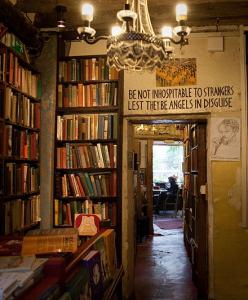MY RELIGION IS KINDNESS
A Zen Meditation
James Ishmael Ford
The Dalai Lama once famously declared, “My religion is very simple. My religion is kindness.” I find it joins for me with an anecdote about the writer Aldous Huxley. As he approached his death he said, “It’s rather embarrassing to have given one’s entire life to pondering the human predicament and to find that in the end one has little more to say than, ‘Try to be a little kinder.’”
Now Zen stories often don’t seem particularly kind. In the great koan collections, the sayings and doings of the Zen masters, insults and even slander are often used as complements. Sometimes as the highest complements. While pushes, shoves, the odd kick, and not infrequent slap might be referred to be some commentator as “grandmotherly kindness.”
So, what is kindness? And what might be a Buddhist kindness, or, more specifically, kindness in Zen? Merriam-Webster, a steady go to for me, defines kindness as the quality or state of being
“kind.” Which isn’t especially helpful. But, turning to “kind,” we find it defined by “sympathy” or “helpfulness.” Another dictionary I consulted speaks of kindness as “generosity.”
And there you go. Sympathy. Helpfulness. Generosity. I find they work. Even in those Zen stories. For me kindness is the state of sympathy for the other, a desire toward helpfulness, and most of all it means generosity of heart. It is a state of being. But there is something about action within it, as well.
Here we begin to touch the old Zen stories. We live in an age where casual acts of violence between human beings are no longer normative, nor acceptable. And I find that all for the good. And we don’t need to emulate the actions of someone in Tenth century China to understand what is actually going on.
And, still going on, but in ways appropriate for our time and place. Now it can be a word. It can be a mock swipe of the Zen teacher’s stick. The phrase, “I spare you thirty blows” works pretty well. It is an encouragement, it is a call, most of all it is a call to presence. Stop thinking too much about it, and come and live in it.
So, beyond the misunderstandings of Zen’s practices, kindness has a host of false approximations. In Buddhist circles these are sometimes called “near-enemies.” Sentimentality for one. Pity for another. Some act of kindness with an expectation of a pay-off is still one more. The truth of the matter is that the kindness I believe the Dalai Lama is pointing to, the kindness I am thinking of represents a possibility always present within our human hearts.
And here we find kindness and Zen.
To use a Buddhist term, I believe kindness is bodhisattva action. It is the manifestation of the generous heart in the world. It isn’t transactional, that looking for some pay-off down the line. Rather this Buddhist kindness, this religion to which the Dalai Lama points, is rooted in the profound realization that we are all of us intimates, all of us profoundly, astonishingly, maybe devastatingly connected. Sympathy is seeing into that connection. And wishing to be helpful follows like steps in a dance. Generosity is sharing with the family where no one is excluded from the family.
Now, kindness, while as natural as natural can be, is also just one among a number of contending possibilities in our lives. We do not have two wolves in our hearts, as that popular story of complex origins goes. Rather we have a whole pack of wolves living within us. So, if the wolf we feed wins, if we are what we do, what follows?
There is a saying attributed to many different people. In one version Mohandas Gandhi tells us, “Your beliefs become your thoughts. Your thoughts become your words. Your words become your habits. Your habits become your values. Your values become your destiny.” Digging around I can find variations of this going back to Ralph Waldo Emerson, to Laozi, and even to Gautama Siddhartha who in the Majjhima Nikaya tells us “Whatever a (person of the way) keeps pursuing with his thinking and pondering, that becomes the inclination of his awareness.”
Ultimately, for me, the Dalai Lama’s line “Kindness is my religion,” is a koan. Outside of the Zen schools the word koan has come to mean a thorny question. And, okay, sure, “kindness is my religion” is certainly a thorny question. All those things of intention and action and transformation, and what they mean; you have a pretty thorny question.
But here I mean koan in the sense of an assertion about reality, which is at the same time, the very same time, an invitation. My religion is kindness. What is that world that we’ve being offered? And, well, what do we want to do with it?
As it turns out, it’s all in your hands.
You know, the Zen way.
The human way…













